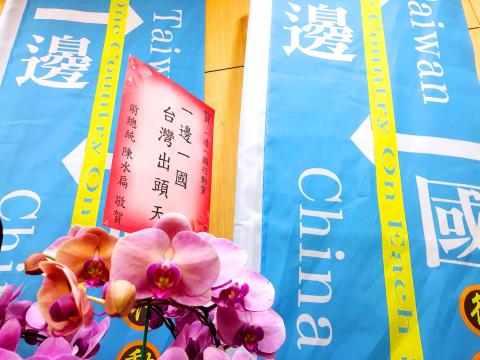The Taiwan Action Party Alliance (TAPA, 一邊一國行動黨) was launched at an event in Taipei yesterday with a number of pan-green camp veterans in attendance in a show of support for the pro-independence group.
The party’s charter calls for “striving for Taiwan to become a sovereign, independent country, and for Taiwan to join as a member country of the UN.”
“Our core foundation is to build up Taiwan as an advanced nation, based on the universal values of freedom, democracy, due process of law, human rights, environmental protection and social justice,” the charter says.

Photo: CNA
The party was created by groups closely associated with former president Chen Shui-bian (陳水扁) as well as Taiwanese independence advocates.
Former vice president Annette Lu (呂秀蓮), former presidential advisers Peng Ming-min (彭明敏) and Wu Li-pei (吳澧培), former premier Yu Shyi-kun (游錫堃) and Taiwanese National Party founder Huang Hua (黃華) were among the green camp dignitaries in attendance.
Chen provided a video message that was aired at the launch, saying that he was confident about the new party’s ability to win 1 million votes in next year’s legislative elections, and win at least three seats or surpass the 5 percent threshold required to be allotted legislator-at-large seats.
He would “work as a gardener, watering and tending the TAPA to help it grow and prevent it from drying up,” Chen said.
After a vote of the new party’s members, a list of 15 executive members was announced, although the party said it would operate by consensus and committee decisionmaking, and not be run by a chairperson.
Former National Taipei University of the Arts president Yang Chyi-wen (楊其文) was chosen to be the party’s first convener.
The government must implement real “Taiwanese education,” as the public has not learned much about Taiwan’s history and its people, Yang said.
“This is very unfair on all of us, as the misguided education and teaching of history has led to talk of ‘maintaining the status quo on cross-strait relations,’ but this is unsuitable for Taiwan,” he said.
TAPA member Janice Chen (陳昭姿) read out the party’s declaration, which states: “We are composed of pro-Taiwan groups, with our shared history, and common sense of responsibility and life mission. Our goal is to build Taiwan into a normal, independent country, for us to stand tall proudly alongside all the other nations of the world.”
“The Democratic Progressive Party is no longer a party capable of embracing diverse voices and opinions, but has regressed into a monolithic party where one person has the final say in everything,” the declaration said.
TAPA’s “mandate is to inspire everyone to have the courage to head on ‘Taiwan’s road’ and to live as proud Taiwanese,” it said.

Taiwan is stepping up plans to create self-sufficient supply chains for combat drones and increase foreign orders from the US to counter China’s numerical superiority, a defense official said on Saturday. Commenting on condition of anonymity, the official said the nation’s armed forces are in agreement with US Admiral Samuel Paparo’s assessment that Taiwan’s military must be prepared to turn the nation’s waters into a “hellscape” for the Chinese People’s Liberation Army (PLA). Paparo, the commander of the US Indo-Pacific Command, reiterated the concept during a Congressional hearing in Washington on Wednesday. He first coined the term in a security conference last

Prosecutors today declined to say who was questioned regarding alleged forgery on petitions to recall Democratic Progressive Party (DPP) legislators, after Chinese-language media earlier reported that members of the Chinese Nationalist Party (KMT) Youth League were brought in for questioning. The Ministry of Justice Investigation Bureau confirmed that two people had been questioned, but did not disclose any further information about the ongoing investigation. KMT Youth League members Lee Hsiao-liang (李孝亮) and Liu Szu-yin (劉思吟) — who are leading the effort to recall DPP caucus chief executive Rosalia Wu (吳思瑤) and Legislator Wu Pei-yi (吳沛憶) — both posted on Facebook saying: “I

Sung Chien-liang (宋建樑), who led efforts to recall Democratic Progressive Party (DPP) Legislator Lee Kun-cheng (李坤城), was released on bail of NT$80,000 today amid outcry over his decision to wear a Nazi armband to questioning the night before. Sung arrived at the New Taipei District Prosecutors’ Office for questioning in a recall petition forgery case last night wearing a red armband bearing a swastika, carrying a copy of Adolf Hitler’s Mein Kampf and giving a Nazi salute. Sung left the building at 1:15am without the armband and covering the book with his coat. Lee said today that this is a serious

A mountain blaze that broke out yesterday morning in Yangmingshan National Park was put out after five hours, following multi agency efforts involving dozens of fire trucks and helicopter water drops. The fire might have been sparked by an air quality sensor operated by the National Center for High-Performance Computing, one of the national-level laboratories under the National Applied Research Laboratories, Yangmingshan National Park Headquarters said. The Taipei City Fire Department said the fire, which broke out at about 11am yesterday near the mountainous Xiaoyoukeng (小油坑) Recreation Area was extinguished at 4:32pm. It had initially dispatched 72 personnel in four command vehicles, 16